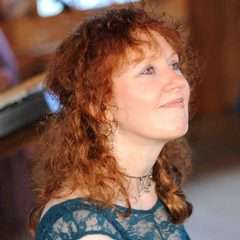|
Back
The Majesty and the Glory New York
David Geffen Hall, Lincoln Center
10/25/2023 - & October 26, 2023
George Frideric Handel: Israel In Egypt
Amanda Forsythe Sonya Headlam (Sopranos), Cody Bowers (Countertenor), Jacob Perry (Tenor), Edward Vogel (Baritone)
Apollo’s Singers (Chorus of Apollo’s Fire), New York Philharmonic Orchestra, Jeannette Sorrell (Conductor)

J. Sorrell (© Apollo’s Fire)
“Handel wrote Italian music better than any Italian, French music better than any Frenchman, English music better than any Englishman, and with the exception of Bach, German music better than any German.”
Sir Thomas Beecham
“He was the greatest composer that ever lived. I would uncover my head and kneel before his tomb.”
Ludwig van Beethoven
We start with the altos of Apollo’s Singers in their first words; “The sons of Israel do mourn.” And the wonders begin. Such purity, such clarity, such evocative words of lamentation. Those words promised–and fulfilled–a glorious night of Handel’s Israel in Egypt.
One must also begin with the thought that this performance, scheduled a year ago, had nothing to do with the present Middle East conflict. In fact, a message in the program made that clear. “The New York Philharmonic stands with the people of Israel as they grapple with the horrors of Hamas.” And then “We grieve for the Palestinians. And all innocent civilians.”
What a contrast to the 92 Street Y, who this week removed a scheduled novelist who had uttered some anti‑Semitic words, placing him in a downtown book store.
Enough. Back to conductor Jeanette Sorrell, whose exuberant leadership made for a glorious–if moderately truncated–version of Handel’s second favorite oratorio, after Messiah. Ms. Sorrell had not omitted any pieces from the first version. But Handel later added some Italianate solos for the audience who longed for them. These were mainly eliminated (whew!), and the oratorio came down to a convenient 75 minutes.
Ms. Sorrell’s choir (she was the founder of the Baroque orchestra/choir Apollo’s Fire) was 50 voices strong. The New York Philharmonic didn’t use period instruments, but there were fewer strings than usual. The solo winds, violin and, occasionally, drum, had a Handelian feeling.
Compare this–if necessary–to a 19th Century performance which apparently used a orchestra near one‑thousand and a chorus of 400, hardly worth it, despite the resplendent martial music.
The choruses here was pure Handelian drama, and Apollo’s Singers made the most of it. Nobody could not be moved with the jubilant third section starting and ending with “I will sing unto” and “Sing ye to”.
God, in his humility must have been mighty proud to have such an appreciation for His mighty–and violent–powers.
For yes, in the second section, God and Handel, showed hopping frogs “even in the King’s chambers” , buzzing string figures to accompany “all manner of flies and lice.” (Did I notice some members of the audience scratching to the itchy music?)
And then came a chorus which is as majestic as anything in Messiah. “The people shall hear and be afraid. All the inhabitants of Canaan” (which some have opined were the original Arabs) “shall melt away.”

Apollo’s Singers (© Apollo’s Singers)
Ms. Sorrell’s soloists while overwhelmed by the frequent choirs, were more than appropriate. This was shown in a duet for the two sopranos, Amanda Forsythe and Sonya Headlam, in “The Lord is my strength and my song.” The lovely lines, mainly in thirds, could have come from Così or Rosenkavalier. Tenor Jacob Perry delivered his recitatives with authority, and baritone Edward Vogel was unassuming, masterful and–with trumpet and oboe accompaniment–deep and reverent.
The audience favorite was countertenor Cody Bowers, possibly for the wrong reason. Yes, his voice was clear, limpid, at time refulgent. But where the other soloists stood and delivered, Mr. Bowers acted his part, waved his arms. It was not distracting, but was distinct from the other reverent pieces.
Finally, the New York Philharmonic, which had few chances to shine (save in the plagues), yet the soloists were more than adequate, especially Sheryl Staples in her two solos.
The youthful Ms. Sorrell must be inordinately proud of her choral forces, which she started, nurtured and led with commanding power. Handel, sitting on a cloud (barely supporting his weight), would have thoroughly enjoyed this fast, dramatic performance of an oratorio which transcended politics, Biblical legend and even the usual adoration of a tribal deity.
Harry Rolnick
|